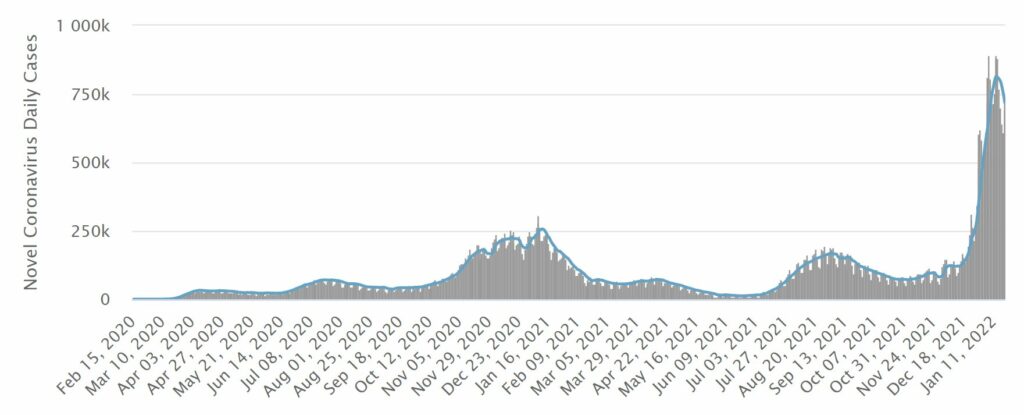As expected, the Omicron situation has evolved significantly since my December 31 post. By that time we had seen a decline in the South Africa COVID-19 curve, while the U.S. and UK cases were still rising rapidly. We were waiting for the UK curve to begin to drop as a predictor of what the United States and other countries lagging the UK could expect. In this post, I’ll share the latest on the COVID curves, as well as my latest insights into individual and group travel.
COVID Curves
Looking at the curves, they certainly bear good news. You can see that the South Africa curve continues to plummet, and does appear to be a reasonably accurate predictor for other countries.

The UK curve peaked on January 4 and is clearly in a downward trend. Over the past two weeks, the UK has gone from a seven-day average of 180,000 cases per day to 90,000 cases per day.

The U.S. curve appears to have peaked on January 13 and looks like it is starting to trend downward, but the results aren’t crystal clear yet. The U.S. holiday weekend may have confounded the data a bit because many states only report data on weekdays. Regardless, the U.S. curve should certainly show tangible drops in the week ahead with big cities leading the way.

I’m also looking at Aruba, a very small Dutch territory off the coast of South America. They went from 27 new cases on December 17, saw their Omicron surge peak at 1,162 new cases on January 5, and were down to 232 new cases on January 20. They went from “start” to “almost finished” in one month.
I have read so many articles the past two weeks with 65% of analysts saying that after Omicron, this coronavirus will become endemic because so many people either have been vaccinated or have been infected by this milder strain giving new potent variants less room to grow and spread. The other 35% say “hold on”, it’s too early to predict the end of the pandemic and there is still potential for new, nasty variants to arrive that could even infect those who had Omicron. I’m not a doctor or scientist, so I am not going to try to predict where I think the pandemic will head after Omicron. I also don’t want to trivialize the impact that the staggering Omicron case count has had on the medical/hospital communities and the physical and mental toll it has taken on healthcare workers. That said, I do have some insights into where travel is likely headed, and there has been a seismic shift in the past couple of weeks.
A “Near-Global Shift”
When Omicron first arrived on the scene in late November, governments around the world were quick to ban travelers from the countries in Southern Africa. By late December, most of these bans had been lifted. Then in January, something very unusual (and encouraging) happened. With Omicron cases spiking around the world, countries started removing travel restrictions. Israel, the poster child for frequent changes to entry and quarantine requirements throughout the pandemic, lifted restrictions for vaccinated travelers. They correctly stated that travel bans seemed to be futile in protecting against COVID spread. Within days, Ireland announced that it was abandoning the requirement for travelers to be tested in advance of arrival, making access to the Emerald Isle significantly easier. And countries around the EU began lifting restrictions on British travelers as the COVID curve began shifting downward.
There is now a clear near-global shift in that countries are re-evaluating both the practicality and economic costs of continued travel lockdowns. They look at countries like Costa Rica which has remained open for nearly a year and hasn’t wavered in remaining open despite both the Delta surge and Omicron surges. And they look at UAE which removed almost all travel barriers during the summer and saw a new influx of travelers during the second half of the year. I referenced “near-global shift” because there are many countries in Asia and South Pacific that continue with strict COVID travel restrictions. China, Japan, and New Zealand are among the nations that remain heavily fortified in their efforts to minimize the impact of the pandemic inside their borders.
Individual Travel Forecast
I expect the governmental shifts in relaxing travel restrictions to be permanent – barring an unexpected variant that combines Omicron’s transmissibility and Delta’s severity. For vaccinated and boosted travelers, this removes one of the two most significant barriers to resuming travel: a sudden shift in government policy that requires you to cancel your trip or significantly compromise on the content of your trip. One key barrier remains: A positive COVID test at the end of your trip requiring you to stay in-country for 7 to 10 days. I am seeing more and more clients saying “yes” they are willing to take that risk. Partly because we are nearing the two year mark since the first shutdown and people are exhausted. Partly because they are making a calculation that the risk of getting COVID while travelling will decline and thus the probability of needing to quarantine at the end of a trip will also decline.
Group Travel Forecast
For groups travelling in January and February, international travel is still filled with caveats. There are many countries where Omicron lags the United States and some countries that remain closed. Many of my former clients when I worked in the university travel market have students stuck in quarantine around the globe. But the group forecast seems brighter for March and beyond. The key questions that group administrators need to answer are: 1) can I risk having a full group or significant part of a group stranded overseas if someone tests positive? 2) how much flexibility do I have to cancel and secure refunds if a trip needs to be cancelled due to a spike in the country of travel or if there is a new, more serious variant on the horizon? 3) do I have any wiggle room to wait until closer to departure to decide “go” or “no go” based on clearer information, or do I need to decide now. I do expect for many groups looking at March travel the answer has already been made and that “no go” is the answer.






